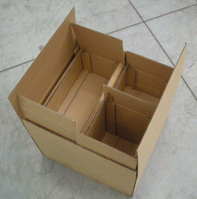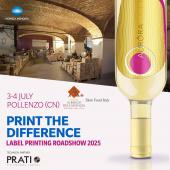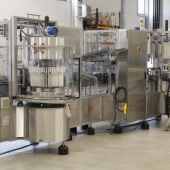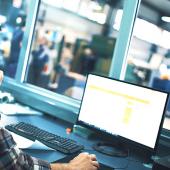DIY cases
ADVANCED PAPERBOARD CONVERTING System SpA presents Freebox™: a system that enables the automatic production inhouse of cases custom sized to fit the object to be packed, starting from a sheet of corrugated cardboard. No resorting to casemakers, no need for packing case storage facilities, with the creation of sturdier boxes that enable material savings.
 The 2012 Packaging Oscar nomination, dedicated to technological innovation, couldn’t have been more justified: the Freebox™ secondary packaging system, designed and produced by the company called System, based in Fiorano Modenese, and officially launched at Ipack-Ima, promises to revolutionize the traditional supply chain. «Practically speaking - declares Umberto Richichi, sales manager of the Modena based company - the solution transfers carton converting activities to within the user company, enabling JIT operation, producing the number of packs needed, when needed, without taking up precious storage space».
The 2012 Packaging Oscar nomination, dedicated to technological innovation, couldn’t have been more justified: the Freebox™ secondary packaging system, designed and produced by the company called System, based in Fiorano Modenese, and officially launched at Ipack-Ima, promises to revolutionize the traditional supply chain. «Practically speaking - declares Umberto Richichi, sales manager of the Modena based company - the solution transfers carton converting activities to within the user company, enabling JIT operation, producing the number of packs needed, when needed, without taking up precious storage space».
Thus one has the elimination of two important case procurement cost items, as well as other savings: The first concerns the material that feeds System’s machine, ie a single sheet of corrugated cardboard measuring 1200x1200 mm (economic submultiple of the standard papermill sheet), which is converted into kind of stream feed from which all the box parts are derived, with zero waste and no offcuts.
The other form of saving derives from the fact that Freebox automatically forms dimensioned cases to suit the specific products to be packed there and then, without wasting a cm of material (nor pallet or truck space). The system also enables the production of containers that are 30-40% sturdier (confirmed by TÜV tests) with 4 corner reinforcements. The gauge can be made thicker than standard at the strategic points and thinner than standard in the non-structural parts, enabling further raw material savings. For a more effective bonding a technique has been used that allows the adhesive to penetrate into the board by specially produced micropores, while labeling becomes superfluous with the direct in-line printing of the containers.
Keywords
Hence saving is one of the concepts behind the project, along with flexibility, ease of installation (everything done in 28 square meters) and ease of use. In fact, thanks to a special program called Freedata, the user inserts the object to be packed and the machine automatically provides the weight and size of the most appropriate case; subsequently, on the basis of the data set, production is started up with the chosen cardboard…) single or multiple corrugate, of various sizes and gauges, kraft or other..) with a variable output of between 4 and 7 boxes a minute, depending on the case size and the type of material used.
And flexibility? «These days, more and more frequently the demand is that the same system perform different operations, that different sized packs containing various products are loaded on the same pallet» Richichi explains.
«System SpA’s Packaging and Logistics divisions are constantly working on these points, and, among other things, have developed an original software to devise the best fitting that, in industrial end-of-line, meaning optimize the management of the various transport packaging units leading to the best pallet array pattern. With Freebox we have taken this idea to the extreme, creating a machine capable of automatically creating all types of packaging required in real time. You can’t get more flexible than that...».

Cross-sector skills
«In designing Freebox - considers Richichi - we have drawn freely from the experience of our group in the ceramics industry where, as is well-known, plants and systems need to be particularly sturdy and fast and be capable of working around the clock seven days a week.
We have borrowed single solutions from this area, like the cardboard cutting blade, and more general solutions, for example concerning the electronics (we built the motor drive, while Beckhoff designed the central unit and axis management) and controls».
The latter is certainly an important feature. «Nine cameras have been placed within the machine, that continuously monitor the process critical points and that also store the recorded data for 10 days. In the event of a breakdown, the videos can be sent via email to our support service, which then informs the operator as to what caused the problem and the best ways of solving it».
Freebox receive the preliminary information via the Copilot touchscreen interface (System Electronics) or via other product dimensional systems visual recognition systems, or from the company's management software. On the basis of these data, the system calculates the right size of the pack in real time and that in a few seconds forms the same, fully printed and ready to be filled with the products.
On average the machine can run without recharging for no less than 6-8 hours and a production rate of 4-7 boxes per minute; once started, 3,000 boxes per shift can be made with no interruptions. According to tests carried out by TÜV Italy on behalf of System, the packaging made with this system is 20 to 30% more resistant to static, dynamic, burst and rolling loads when compared to the traditional RSC format prebuilt at the casemakers. This leads to less deformation and greater stacking resistance, in addition to a considerable saving of corrugated cardboard (up to 50%) due to the possibility of using lighter materials for the parts of the case not subjected to stress. In addition, to be able to dimension the packaging to fully fill the geometry of the pallet and rationalize storage, where the amount of boxes in storage can be doubled (55%), generates other savings and is reflected positively on shipping costs but also on the environment.
«Freebox can be used in all logistics and packaging sections, and can be used in all sectors, especially by companies that have a wide range of products to be packaged as typically happens in e-commerce» Richichi points out that: «Its userfriendliness enables its distribution in any kind of concern. Just like a fax: you just key in the number, press a button and wait for it to finish...».
System, the saga of inventiveness
Rotocolor is a tile decorating machine of which some 15,500 units have already been installed worldwide; indeed the manufacturer estimates that 90% of the tiles on the market are printed using this technology. Laminam is a revolutionary ceramic material that looks like plastic: it doesn’t burn, doesn’t change color "even in a thousand years", is very light and only 3 mm thick and is so sturdy it can be used to build tables, flooring or whatever. Freebox is the first all-in-one machine, capable of creating cases of any size starting from a strip of corrugated cardboard of various types and thicknesses: a sort of "pocket-sized piece of converting equipment" to be installed in factories, e-commerce companies, contractors, logistics concerns...
These are but some examples of machines made by System SpA, a company with a strong research vocation, fuelled by constant investments, which has generated many patents and fruitful cooperation agreements with international science centers. Founded in 1970 by Franco Stefani - Modanese from Prignano sulla Secchia born in ’45, technical engineer at the age of 16 and entrepreneur when he was 21 - the company now has 10 works, some 1300 employees and 37 offices in 24 countries around the world. After Coemss, set up at the outset, Stefani founded System Ceramics, immediately followed by System Logistics and System Electronics.
In the year 2000 the laminates division was set up, dedicated to systems for constructing the revolutionary 3 mm plate, along with Laminam, the company that markets the said product. In 2005 System SpA bought up New Era (industrial automation for the ceramics industry) and FTP automation (packaging and palletizing in the ceramics and food industry), followed in 2007 Serigrafica Tosi (ceramic graphics and design) and in 2009 Micromax, that subsequently became System Packaging.

















